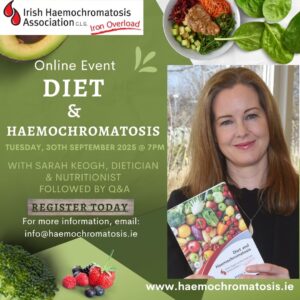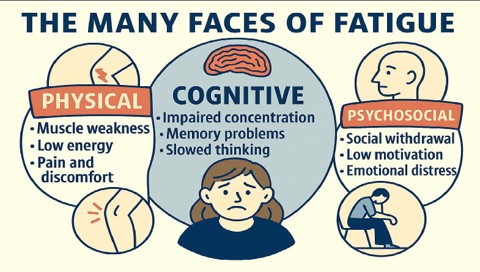
Diet & Haemochromatosis Online Event
Register today for a Diet & Haemochromatosis online event with Sarah Keogh, Consultant Nutritionist and Dietician www.eatwell.ie The event takes place on Tuesday, 30th September @ 7pm

Dr. Michelle Murphy recently presented an online session with us for ‘Managing Chronic Fatigue’. Michelle is a Psychotherapist and lectures in health and social care and has a Doctorate in Psychotherapy. She has been supporting people living with neurological conditions for over 15 years. Her work is grounded in compassion, listening, and helping people navigate both the emotional and practical challenges of brain health. Michelle offers practical, evidence-based brain health tips for everyday life.
You can find links to some of Dr. Murphy’s patient support information on fatigue here:
Fatigue Management in Haemochromatosis

Why am I experiencing fatigue?
Fatigue is one of the most common symptoms of haemochromatosis — and it can be difficult to manage without understanding the cause.
Here’s why iron overload often leads to extreme tiredness:
Organ Dysfunction: Excess iron can damage vital organs like the liver and heart, reducing their function and contributing to persistent fatigue.
Joint and Muscle Pain: Iron deposits in the joints may lead to pain, stiffness, and physical exhaustion.
Hormonal Imbalances: Iron affects hormone-producing glands such as the thyroid, which play a key role in regulating energy levels and mood.
Inflammation: Chronic inflammation caused by iron overload can make fatigue even more severe.
Treatment Side Effects: In the short term, treatments like phlebotomy or chelation may also contribute to feelings of fatigue.
Special thanks to Dr. Michelle Murphy for her continued support and insight into the complex symptoms like fatigue. Her work helps make these experiences easier to understand and manage.
You can find a complete bio of Dr. Murphy below. If you would like more materials on how to manage chronic fatigue with haemochromatosis, email [email protected] for more information
Dr. Michelle Murphy
Michelle’s passion lies in raising awareness of the invisible impacts of neurological conditions and making support more accessible across Ireland. She currently coordinates a postgraduate Cognitive Behavioural Therapy (CBT) training programme and continues to advocate for long-term, meaningful emotional support within community services.
In 2019, Michelle completed her Doctorate in Psychotherapy at Dublin City University. Her research focused on the emotional needs of people living with neurological conditions — and the importance of long-term, holistic support. Since then, she has helped to shape community neurorehabilitation and mental health services in the West of Ireland.

Michelle enjoys sharing simple, evidence-based brain health strategies that are practical, doable, and drawn from both research and the real experiences of those she works with. These are micro-habits and tips that can be self-directed and integrated into daily life — no pressure, just possibilities.
Outside of her professional work, she’s a big Munster rugby and Limerick hurling fan, loves baking (not always successfully!), yoga (enthusiastically, not expertly), and relaxing with psychological thriller audiobooks.

Register today for a Diet & Haemochromatosis online event with Sarah Keogh, Consultant Nutritionist and Dietician www.eatwell.ie The event takes place on Tuesday, 30th September @ 7pm

We were delighted to receive a generous donation of €1,160 from St. Patrick’s Cathedral community fundto support our work. Special thanks to our volunteer, Jim

Dr. Michelle Murphy, a Psychotherapist and lecturer in health and social care specialist and therapist, offers practical advice for patients experiencing chronic fatigue